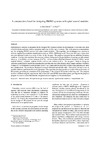Please use this identifier to cite or link to this item:
https://accedacris.ulpgc.es/jspui/handle/10553/41561
| Title: | A computational tool for designing BWRO systems with spiral wound modules | Authors: | Ruiz-García, Alejandro De La Nuez Pestana, Ignacio |
UNESCO Clasification: | 3308 Ingeniería y tecnología del medio ambiente 330806 Regeneración del agua |
Keywords: | Brackish water RO system design Reverse osmosis Spiral-wound modules Computational tool |
Issue Date: | 2018 | Journal: | Desalination (Amsterdam) | Abstract: | Deficiencies in commercial programs for the design of RO systems motivate the development of new ones that allow a flexible design and more realistic operating conditions for this type of systems. This work presents a computational tool for designing BWRO systems with spiral-wound modules. This algorithm has advantages over commercial software supplied by membrane manufacturers (such as ROSA, IMSDesign or Q(+) Projection Software), whose trial-and-error approach results in a waste of time for the designer. The proposed program has an additional boundary condition: to achieve the maximum flux recovery without scaling due to the precipitation of sparingly soluble mineral salts (e.g., silica (SiO2), calcium carbonate (CaCO3), calcium sulphate dihydrate (denoted simply as CaSO4), barium sulphate (BaSO4), strontium sulphate (SrSO4) and calcium fluoride (CaF2)). The designer's liberty to change the constrains established by membrane manufacturers provides the user with a desired safety margin and more flexibility. A range of 1 to 8 elements in each pressure vessel, 1 to 3 stages and the possibility of inter-stage pumping are taken into consideration. The results are displayed in a multi-filterable and sortable table. This allows the user to see all possible solutions and choose the most appropriate. The algorithm also has a predictive model of the performance of RO systems, providing an estimation of the performance of the selected RO system in the long term. The program has been validated using the experimental data of four full-scale BWRO desalination plants, proving that the proposed program is closer to actual data than the computational tool supplied by the manufacturer. | URI: | https://accedacris.ulpgc.es/handle/10553/41561 | ISSN: | 0011-9164 | DOI: | 10.1016/j.desal.2017.10.040 | Source: | Desalination [ISSN 0011-9164], v. 426, p. 69-77 |
| Appears in Collections: | Artículos |
SCOPUSTM
Citations
45
checked on Jun 8, 2025
WEB OF SCIENCETM
Citations
45
checked on Jun 8, 2025
Page view(s)
115
checked on Aug 31, 2024
Download(s)
944
checked on Aug 31, 2024
Google ScholarTM
Check
Altmetric
Share
Export metadata
Items in accedaCRIS are protected by copyright, with all rights reserved, unless otherwise indicated.
